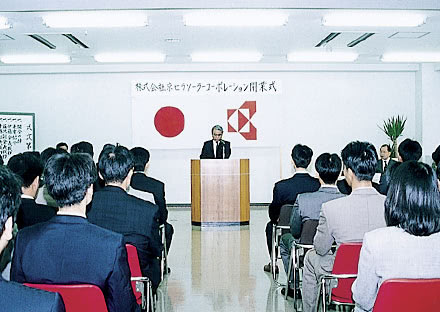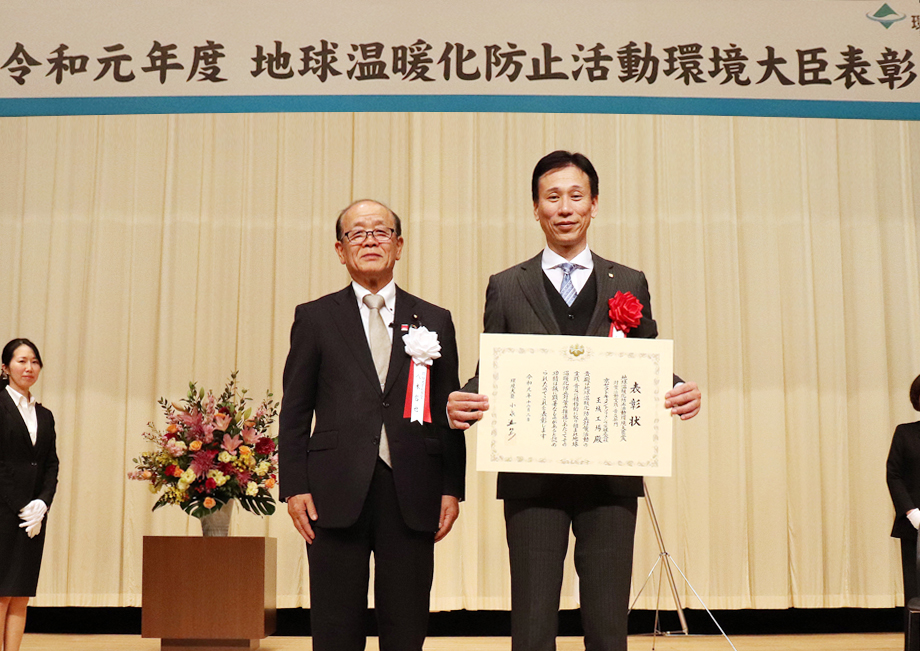Our Solar Power Spirit Our thoughts on solar power generation

At Kyocera, we conduct business with unwavering enthusiasm, never losing the spark that keeps us going. How is this possible? Simply put, because there is a great cause in this field that we are passionate about. Our motivation for starting the solar energy business was to contribute to people's happiness through solar energy, and our commitment to this goal remains unchanged.
Founder Kazuo Inamori, Kyocera Corporation
※ From the solar energy 30th anniversary appreciation commemorative lecture (September 2, 2005)
We were among the first to focus on solar power generation in order to achieve a sustainable society.
For the world, for the people. Half a century of unyielding altruism.
When humans subsisted by hunting and gathering, they coexisted with nature. However, with the emergence and development of energy-consuming civilizations, environmental problems such as deforestation, desertification, and climate change have become more serious. What can we do to help all mankind develop a sustainable society while minimizing the burden on the environment? One answer is solar power generation, a renewable energy source. The conviction held by Kyocera about half a century ago, that there will definitely come a time in the future when solar power generation will be indispensable for the sake of the world and for people, has now become a worldwide conviction, and solar power generation systems are becoming more popular not only in urban areas, but spreading on a global scale to people looking for new energy sources, such as in areas without electricity.
Kyocera launched its solar power generation business in 1975, after the first oil crisis. This was a time when the need for energy alternatives to oil was attracting worldwide attention. However, in the 1980s, oil supply and demand eased, and conditions remained extremely difficult for the solar power generation business for a long time. While domestic manufacturers withdrew from the market one after another, Kyocera continued to pursue its solar power generation business, sticking to our original purpose, tenaciously working on technological innovation, reducing the cost of solar cells, and working hard to popularize solar power generation systems.
As of the end of fiscal 2018, the number of household solar power generation installations in Japan reached approximately 2.52 million*1, with more spreading to public and industrial use for mega solar power generation and corporate installations.
On a global scale, the cumulative capacity of solar power generation systems has reached approximately 100 GW as of 2018, and the approximate share of solar power generation from the total power supply is 2.6% globally, 4.3% in Europe, 7.9% in Germany, and 6.8% in Japan. *2
Kyocera continues to make efforts to further popularize solar power generation systems in order to achieve a low-carbon society and preserve the Earth for the next generation.
- *1“Status of Solar Power Generation” published by the Japan Photovoltaic Energy Association on October 29, 2019
- *2From the International Energy Agency Photovoltaic Power Systems Programme (IEA PVPS) “Snapshot of Global Photovoltaic Markets 2019”



History Since 1975 History of the Kyocera Solar Power Generation Business
1975

1975
Started research and development of solar cells
Kyocera played a central role in establishing Japan Solar Energy (JSEC) with four companies, including Matsushita Electric Industrial Co., Ltd. (currently Panasonic Corporation) and Sharp Corporation. At that time, the cost of solar cells was high at 20,000 to 30,000 yen per watt.

1982
Mass production of polycrystalline silicon solar cells begins
We are the first in the world*3 to begin full-scale mass production of solar cells using the polycrystalline silicon casting method. The following year, we also established an overseas division and began shipping to Europe and America.
- *3As of February 1982

1998
Global No. 1 in production of solar cells*4
No. 1 for two consecutive years in 1998 and 1999.
- *4From "PV NEWS Vol.18 No.2 February 1999” (as of 1999)

2011
Obtained world's first*5 Long-term Sequential Test certification
Kyocera's polycrystalline silicon solar cell modules are the first in the world to obtain Long-term Sequential Test (a test that takes into account the long-term actual usage environment of Solar Panels) certification by TÜV Rheinland (Headquarters: Germany), a third-party certification body for safety and quality.
- *5From TÜV Rheinland website

2013
Kagoshima Nanatsujima Mega Solar Power Plant begins 70 MW operation
The Kagoshima Nanatsujima Mega Solar Power Plant began operations on November 1. 290,000 Solar Panels, with a total capacity of 70 MW, were installed on a vast piece of land measuring approximately 1.27 million square meters (approximately the size of 27 Tokyo Domes).

2016
Participation in VPP construction demonstration project
VPP (virtual power plant) integrally controls energy resources, such as distributed solar power generation systems, and makes them function like a single power plant. We are participating in a demonstration project conducted by the Ministry of Economy, Trade and Industry and playing a role in supporting the future of energy in Japan.

2019
Providing new solar power generation services
Established Kyocera Kanden Energy and began providing energy services that install residential solar power generation systems at essentially no cost and transfer them free of charge after the contract expires. Additionally, we established Kyocera EPA, which handles industrial lease schemes, and have begun offering solar power generation system lease schemes to businesses that wish to provide energy services using renewable energy.
Technology Kyocera Challenges

VPP technology to maximize solar energy
With a VPP (virtual power plant), which aggregates energy resources such as distributed solar power generation systems using IoT and functions efficiently, we will create a system that allows the power generated by Solar Panels in ordinary homes and small power plants to be combined into a single power source. Demonstration experiments are underway with the aim of reducing dependence on conventional supply systems that rely on large-scale centralized power sources and which are prone to blackouts during disasters, and making use of renewable energy stably and effectively. Kyocera is actively working on technological innovation aimed at achieving a low-carbon society, including participating in demonstration projects conducted by the Ministry of Economy, Trade and Industry.

Development and popularization of the world's first*6 residential power storage system*7 with built-in clay-type lithium-ion storage batteries
Kyocera has developed a stationary residential power storage system with a built-in clay-type lithium-ion storage battery that has the advantages of long life, excellent safety, and low cost, which has been on the market since 2020. This system promotes effective storage of surplus electricity from solar power generation and contributes to achieving a low-carbon society.
- *6According to Kyocera research (as of October 2, 2019). As a clay-type energy storage system.
- *7Residential power storage system supply is only available for Japanese domestic market.

Launch of Ene-Farm Mini, the world's smallest*8 high-efficiency residential fuel cell cogeneration system*9
In collaboration with Tokyo Gas Co., Ltd., we developed Ene-Farm Mini, the world's smallest*8 SOFC-type residential fuel cell cogeneration system, which was launched on October 30, 2019. We will continue to aim to further expand the use of the very environmentally friendly Ene-Farm as part of making customer lives more comfortable, preserving the global environment, and enhancing resilience.
- *8According to Kyocera research (as of October 10, 2019). In residential stationary fuel cell cogeneration systems.
- *9Residential fuel cell cogeneration system supply is only available for Japanese domestic market.
Sustainability Global Environment Initiatives

Received the Minister of the Environment Award for Global Warming Prevention Activities for 10 consecutive years
The Kyocera Group has received the Ministry of the Environment's Minister of the Environment Award for Global Warming Prevention Activities for 10 consecutive years since fiscal year 2010, which honors individuals and organizations that have contributed to the prevention of global warming, making it the highest number of consecutive times the award has been won. The Kyocera Document Solutions Mie Tamaki Factory received the award in 2019 for overall marks due to implemented energy-saving activities such as generating energy and reducing CO2 emissions by using a solar power generation system, reducing the power load by installing highly efficient air conditioning equipment and switching to LED lighting, as well as environmental contribution activities rooted in the local community.

Kyocera green communication
Since fiscal year 2002, Kyocera has conducted Traveling Environment and Energy Classes on solar cells as a theme to deepen children's understanding of environmental issues and energy as part of school education, and to foster a sense of concern for the Earth. In fiscal year 2017, classes were held for 4,885 children at 76 elementary schools, mainly in the Kyocera Group's 16 locations (9 prefectures). Classes were also held at an elementary school in Shanghai, China, and since the start of the program, there is a cumulative total of nearly 120,000 participants in Japan and abroad (as of the end of March 2019).
Prospective Looking to the Future
Creating the future and energy together
The Paris Agreement, an international framework for climate change from 2020, has set common long-term goals worldwide. The aim is for countries to work together to reduce greenhouse gas emissions and curb climate change. In line with this global trend, Japan is also aiming to achieve the goals of the Paris Agreement and realize the 2030 Energy Mix, which represents the ideal power source mix with renewable energy as the main power source. In addition, companies are also making moves toward achieving a low-carbon society as exemplified by the international business alliance RE100, which aims to use renewable energy to generate 100% of the electricity it uses.
For Japan to become the world's forerunner in solar energy, to become a model for a sustainable, low-carbon society, and to shift to renewable energy as the main power source. Our mission is to continue contributing to society by providing high-quality energy products and services, including solar power generation. With a spirit that has remained unchanged since our founding, we will deliver products and services that meet the needs of the times, and work with our customers to create and cultivate the energy that will support Japan's future.






